《木马赢家》中的人物介绍
《木马赢家》中的人物介绍(精品文档)
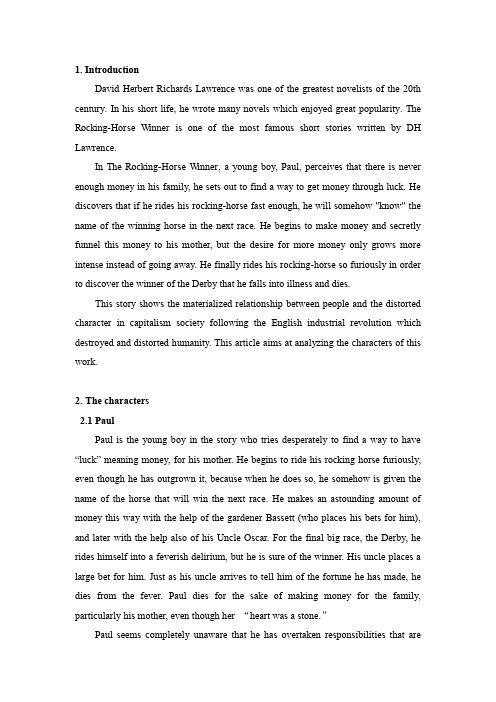
1. IntroductionDavid Herbert Richards Lawrence was one of the greatest novelists of the 20th century. In his short life, he wrote many novels which enjoyed great popularity. The Rocking-Horse Winner is one of the most famous short stories written by DH Lawrence.In The Rocking-Horse Winner, a young boy, Paul, perceives that there is never enough money in his family, he sets out to find a way to get money through luck. He discovers that if he rides his rocking-horse fast enough, he will somehow "know" the name of the winning horse in the next race. He begins to make money and secretly funnel this money to his mother, but the desire for more money only grows more intense instead of going away. He finally rides his rocking-horse so furiously in order to discover the winner of the Derby that he falls into illness and dies.This story shows the materialized relationship between people and the distorted character in capitalism society following the English industrial revolution which destroyed and distorted humanity. This article aims at analyzing the characters of this work.2.The characters2.1 PaulPaul is the young boy in the story who tries desperately to find a way to have “luck” meaning money, for his mother. He begins to ride his rocking horse furiously, even though he has outgrown it, because when he does so, he somehow is given the name of the horse that will win the next race. He makes an astounding amount of money this way with the help of the gardener Bassett (who places his bets for him), and later with the help also of his Uncle Oscar. For the final big race, the Derby, he rides himself into a feverish delirium, but he is sure of the winner. His uncle places a large bet for him. Just as his uncle arrives to tell him of the fortune he has made, he dies from the fever. Paul dies for the sake of making money for the family, particularly his mother, even though her “heart was a stone.”Paul seems completely unaware that he has overtaken responsibilities that arerightly his parents’. He seems only concerned with relieving the anxiety he perceives in the house caused by a lack of money. He tries to understand why there is not enough money by asking his mother, but she only says that his father “has no luck.”He directly associates luck with money, so the gambling seems like a natural solution to the problem. He is so innocent in his enthusiasm for the game he begins playing with Bassett that even when his uncle discovers that he has been gambling, he does not stop Paul from gambling further. Even though Paul is still a child, all of the adults, Bassett, Uncle Oscar, and Paul’s mother, seem to treat him like an adult. No one anticipates that Paul will pay a huge price for playing this game. No one even questions Paul’s ability to pick the winners of the horse races, or wonders how in the world Paul is able to pick winners so accurately.Throughout the story Paul remains innocent, as well as desperate, to help his mother, who seems oblivious to Paul’s concerns. Although it is clear to the reader that Paul is very intelligent and sensitive, no one in the story seems to notice or appreciate Paul’s gifts until it is too late.2.2 HesterHester is Paul’s mother, who is incapable of loving others. She is not only obsessed with money, but she is also irresponsible with the money she does get. When Paul arranges through his attorney to give her a thousand pounds a month from his winnings, she immediately begs the attorney for the entire amount. However, instead of paying her debts, she spends the money on new things for the house. This results in an even greater need for more money. She also does not express any thanks for this sudden windfall, depriving Paul of the joy of providing the much-needed income for his family.Although at the end of the story Hester becomes increasingly concerned about Paul’s deteriorating health, she still does not love him, even when he dies. At the beginning of the story, it is stated that “at the center of her heart was a hard little place that could not feel love, no, not for anybody.”This image is repeated at the end of the story, when Hester sits by her son’s bedside “feeling her heart had gone,turned actually into a stone.”Before he dies Paul asks “Mother, did I ever tell you? I’m lucky,”she responds, “No, you never did.”However, the reader remembers that Paul did, indeed, tell her that he was lucky earlier in the story. Since she pays little attention to him, she does not remember this.When Hester finally receives the financial fortune she has always wanted but loses her son in the process, the reader realizes that Hester will probably not feel the loss of her son and will probably waste all that money in record time. All of these details show Hester to be cold, unfeeling, wasteful, and shallow.2.3 BassettBassett is the family gardener who helps Paul place bets on horses. He used to work around horses and racing and he talks about racing all the time, so it seems reasonable that Paul would seek his advice. He takes the boy seriously and follows all the boy’s instructions in placing the bets. He also keeps Paul’s money safely hidden away, at least until Uncle Oscar gets involved. He is the only adult who treats Paul with a serious respect. It is Bassett’s seriousness that convinces Uncle Oscar that Paul’s gift for picking winners is real. He is trustworthy and kind, but he is also a servant, so once Uncle Oscar takes over, he respectfully withdraws from the action. So he is passive, loyal, a little bit afraid of his superiors, and somewhat greedy to the extent he participates in Paul’s winnings at the track.2.4 Oscar CresswellOscar Cresswell is Paul’s uncle and Hester’s brother. He is in a better financial position than Hester, since he owns his own car and a place in Hampshire. This is because he inherited the entire family fortune, leaving Hester to depend on her husband for support. It is Uncle Oscar who stumbles upon Paul’s secret of earning money through gambling, but he does not at first believe in Paul’s gift. He thinks that Paul is not serious and treats the boy as if he were merely playing a game. After Oscar realizes that Paul’s tips are dependable, he encourages the gambling. Oscar arranges for a lawyer to funnel money to Hester. He also bets his own money, using Paul’s tips for his own profit.Although Uncle Oscar seems harmless at first, the reader becomes aware that heis using Paul for his own benefit. He makes no effort to teach Paul about being careful with money or the dangers of gambling. Oscar does nothing to help Hester and her family, neither by giving money nor by helping Hester budget what money she does have. Because Oscar only uses Paul for his own financial gain, he is revealed to be shallow and selfish.3. ConclusionThis novel is short in length, and there are only four main characters. However, the author uses very skillful describe techniques which perfectly creates the vivid characters of this novel. D.H Lawrence criticized the stupid and ignorant situation of modern society and the degenerated humanity in his later works by his talented writing and “The Rocking-Horse Winner” is a typical one.Reference王军.英国短篇小说赏析.新华出版社,2007 年1 月.秦立慧.浅析《木马赢家》中失职的父母,吉林省教育学院学报,2012年7月.魏平玲.《木马赢家》中保罗的自卑情绪探析,安徽工业大学学报:社会科学版,2011年第6期。
《木马赢家》的伦理思索
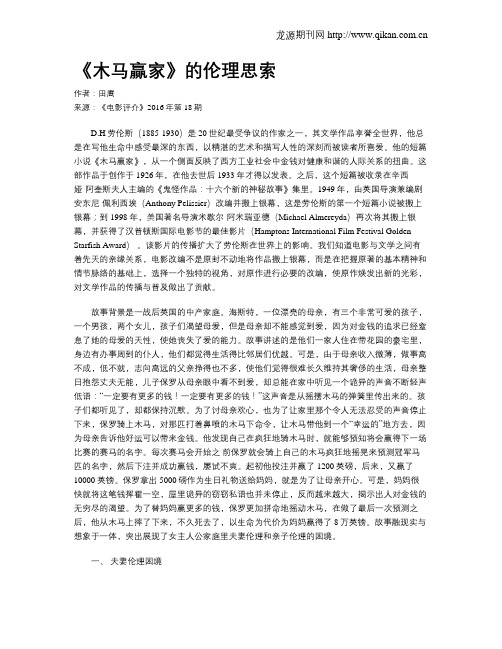
《木马赢家》的伦理思索作者:田鹰来源:《电影评介》2016年第18期D.H劳伦斯(1885-1930)是20世纪最受争议的作家之一,其文学作品享誉全世界,他总是在写他生命中感受最深的东西,以精湛的艺术和描写人性的深刻而被读者所喜爱。
他的短篇小说《木马赢家》,从一个侧面反映了西方工业社会中金钱对健康和谐的人际关系的扭曲。
这部作品于创作于1926年,在他去世后1933年才得以发表。
之后,这个短篇被收录在辛西娅·阿奎斯夫人主编的《鬼怪作品:十六个新的神秘故事》集里。
1949年,由英国导演兼编剧安东尼·佩利西埃(Anthony Pelissier)改编并搬上银幕,这是劳伦斯的第一个短篇小说被搬上银幕;到1998年,美国著名导演米歇尔·阿米瑞亚德(Michael Almereyda)再次将其搬上银幕,并获得了汉普顿斯国际电影节的最佳影片(Hamptons International Film Festival Golden Starfish Award)。
该影片的传播扩大了劳伦斯在世界上的影响。
我们知道电影与文学之间有着先天的亲缘关系,电影改编不是原封不动地将作品搬上银幕,而是在把握原著的基本精神和情节脉络的基础上,选择一个独特的视角,对原作进行必要的改编,使原作焕发出新的光彩,对文学作品的传播与普及做出了贡献。
故事背景是一战后英国的中产家庭。
海斯特,一位漂亮的母亲,有三个非常可爱的孩子,一个男孩,两个女儿,孩子们渴望母爱,但是母亲却不能感觉到爱,因为对金钱的追求已经窒息了她的母爱的天性,使她丧失了爱的能力。
故事讲述的是他们一家人住在带花园的豪宅里,身边有办事周到的仆人,他们都觉得生活得比邻居们优越。
可是,由于母亲收入微薄,做事高不成,低不就,志向高远的父亲挣得也不多,使他们觉得很难长久维持其奢侈的生活,母亲整日抱怨丈夫无能,儿子保罗从母亲眼中看不到爱,却总能在家中听见一个诡异的声音不断轻声低语:“一定要有更多的钱!一定要有更多的钱!”这声音是从摇摆木马的弹簧里传出来的。
《木马赢家》中保罗的悲剧成因解读
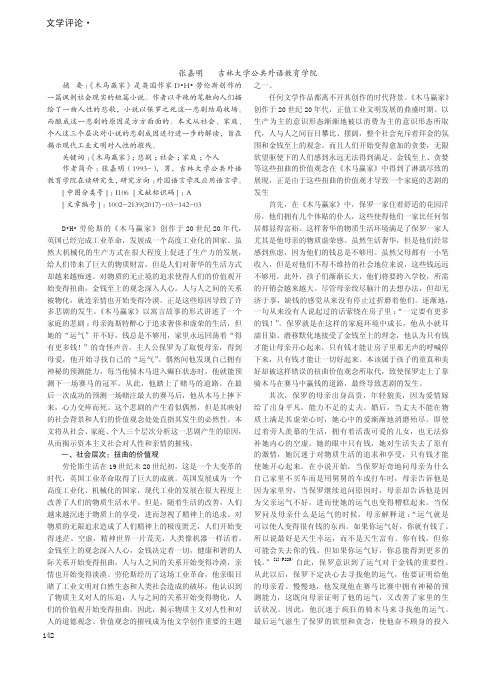
文学评论·外国文学《木马赢家》中保罗的悲剧成因解读张嘉明 吉林大学公共外语教育学院摘 要:《木马赢家》是英国作家D•H•劳伦斯创作的一篇讽刺社会现实的短篇小说。
作者以辛辣的笔触向人们描绘了一曲人性的悲歌,小说以保罗之死这一悲剧结局收场。
而酿成这一悲剧的原因是方方面面的。
本文从社会、家庭、个人这三个层次对小说的悲剧成因进行进一步的解读,旨在揭示现代工业文明对人性的摧残。
关键词:《木马赢家》;悲剧;社会;家庭;个人作者简介:张嘉明(1993-),男,吉林大学公共外语教育学院在读研究生,研究方向:外国语言学及应用语言学。
[中图分类号]:I106 [文献标识码]:A[文章编号]:1002-2139(2017)-03-142-03D•H•劳伦斯的《木马赢家》创作于20世纪20年代,英国已经完成工业革命,发展成一个高度工业化的国家。
虽然大机械化的生产方式在很大程度上促进了生产力的发展,给人们带来了巨大的物质财富,但是人们对奢华的生活方式却越来越痴迷。
对物质的无止境的追求使得人们的价值观开始变得扭曲,金钱至上的观念深入人心。
人与人之间的关系被物化,就连亲情也开始变得冷漠。
正是这些原因导致了许多悲剧的发生。
《木马赢家》以寓言故事的形式讲述了一个家庭的悲剧:母亲海斯特醉心于追求奢侈和虚荣的生活,但她的“运气”并不好,钱总是不够用,家里永远回荡着“得有更多钱!”的奇怪声音。
主人公保罗为了取悦母亲,得到母爱,他开始寻找自己的“运气”。
偶然间他发现自己拥有神秘的预测能力,每当他骑木马进入癫狂状态时,他就能预测下一场赛马的冠军。
从此,他踏上了赌马的道路。
在最后一次成功的预测一场赌注最大的赛马后,他从木马上摔下来,心力交瘁而死。
这个悲剧的产生看似偶然,但是其映射的社会背景和人们的价值观念处处直指其发生的必然性。
本文将从社会、家庭、个人三个层次分析这一悲剧产生的原因,从而揭示资本主义社会对人性和亲情的摧残。
一、社会层次:扭曲的价值观劳伦斯生活在19世纪末20世纪初,这是一个大变革的时代,英国工业革命取得了巨大的成就。
《木马赢家》中保罗的悲剧成因解读
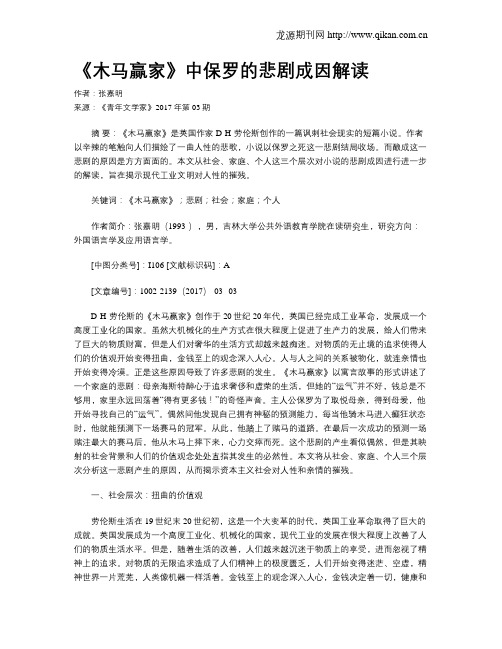
《木马赢家》中保罗的悲剧成因解读作者:张嘉明来源:《青年文学家》2017年第03期摘要:《木马赢家》是英国作家D·H·劳伦斯创作的一篇讽刺社会现实的短篇小说。
作者以辛辣的笔触向人们描绘了一曲人性的悲歌,小说以保罗之死这一悲剧结局收场。
而酿成这一悲剧的原因是方方面面的。
本文从社会、家庭、个人这三个层次对小说的悲剧成因进行进一步的解读,旨在揭示现代工业文明对人性的摧残。
关键词:《木马赢家》;悲剧;社会;家庭;个人作者简介:张嘉明(1993-),男,吉林大学公共外语教育学院在读研究生,研究方向:外国语言学及应用语言学。
[中图分类号]:I106 [文献标识码]:A[文章编号]:1002-2139(2017)-03--03D·H·劳伦斯的《木马赢家》创作于20世纪20年代,英国已经完成工业革命,发展成一个高度工业化的国家。
虽然大机械化的生产方式在很大程度上促进了生产力的发展,给人们带来了巨大的物质财富,但是人们对奢华的生活方式却越来越痴迷。
对物质的无止境的追求使得人们的价值观开始变得扭曲,金钱至上的观念深入人心。
人与人之间的关系被物化,就连亲情也开始变得冷漠。
正是这些原因导致了许多悲剧的发生。
《木马赢家》以寓言故事的形式讲述了一个家庭的悲剧:母亲海斯特醉心于追求奢侈和虚荣的生活,但她的“运气”并不好,钱总是不够用,家里永远回荡着“得有更多钱!”的奇怪声音。
主人公保罗为了取悦母亲,得到母爱,他开始寻找自己的“运气”。
偶然间他发现自己拥有神秘的预测能力,每当他骑木马进入癫狂状态时,他就能预测下一场赛马的冠军。
从此,他踏上了赌马的道路。
在最后一次成功的预测一场赌注最大的赛马后,他从木马上摔下来,心力交瘁而死。
这个悲剧的产生看似偶然,但是其映射的社会背景和人们的价值观念处处直指其发生的必然性。
本文将从社会、家庭、个人三个层次分析这一悲剧产生的原因,从而揭示资本主义社会对人性和亲情的摧残。
从《金锁记》到《木马赢家》——论金钱对人性的异化

爆蛾种摩教学探讨 HAI XIA KE XUE从《金锁记》到《木马赢家》—论金钱对人性的异化福建师范大学协和学院庞慧英[摘要]张爱玲和劳伦斯是中国和英国现代主义文学时期的重要作家。
在他们的众多作品中,《金锁记》和《木马赢家》在反映金钱对人性的扭曲和异化方面有高度的相似性。
《金锁记》中的七巧把自己困在一个黄金枷锁里,一步一步丧失人性。
《木马羸家》中的小男孩保罗,为了帮助母亲获得更多的金钱不断地摇动木马,最终丧失人性、丧失生命。
该文对比分析了两部作品中所反映出来的金钱对个人自我的异化,以及人与人之间关系的异化。
[关键词]金锁记木马嬴家比较文学人性异化1概述在二十世纪中国文学史上,张爱玲是一位有传奇色彩的 作家,正如夏志清先生认为,“对于一个研究现代中国文学的 M说,张爱玲该是今日中国最优秀最重要的作家”[1]。
关于 人性的研究一直是张爱玲作品关注的主题。
在《金锁记》中,张爱玲刻画了一位性格暴躁、心理变态,有着强烈占有欲和 疯狂报复欲的母亲形象。
在这部作品中,张爱玲把金钱对人 性的异化作用描写得淋漓尽致、惊心动魄。
《木马赢家》是劳伦斯晚年创作的短篇小说之一。
故事 探讨了劳伦斯所关注的人与人之间的关系,从一个侧面反映 了西方工业社会中金钱对于人性以及人与人之间关系的扭曲 和异化。
故事中的小男孩保罗渴望母爱,但是母亲却无法感 受到爱,也无法给予爱。
对于金钱和奢华生活无止境的追求 扼杀了她母爱的本能,使她失去了爱的能力。
2个人的自我异化异化,本来是一个哲学范畴的概念,马克思主义哲学认 为,异化是人的生产及其产品反过来统治人的一种社会现象。
在异化中,人丧失能动性,人的个性不能全面发展,只能片 面甚至畸形发展[2]。
人性的扭曲与异化一直是文学作品关注 的主题。
随着工业的发展,社会的进步,人们可以越来越多 地享受物质财富,伴随着物质文明的发展,现代人也经历着 精神家园的荒芜。
劳伦斯在他的作品中深刻剖析资本主义工 业文明在发展进程中产生的种种问题和矛盾,揭示人们内心 深处所遭受的创伤。
浅议《木马赢家》中人与人关系的异化

浅议《木马赢家》中人与人关系的异化英国作家戴·赫·劳伦斯是西方近现代文学史批判现实主义传统的继承者。
他以其敏感、犀利的文笔,向人们揭示了资本主义工业文明在发展过程中所产生的种种矛盾和问题,使人们认识到这是一个全面异化的世界。
在《查特莱夫人的情人》一书中,作家开宗明义地指出:“我们的时代说到底是一个悲剧性的时代,所以,我们才不愿意悲剧性地对待它。
”的确,随着19世纪工业革命在英国的完成,英国的社会发展步入了加速度的快车道,但同时也似乎走上了一条不归路,这就是生态、世态乃至人自身的身态的全方位的“异化”。
异化,本来是一个哲学范畴的概念,马克思主义哲学认为,异化是人的生产及其产品反过来统治人的一种社会现象。
在异化中,人丧失能动性,人的个性不能全面发展,只能片面甚至畸形发展。
“异化”在德国古典哲学中被提到哲学的高度,从而进一步扩展和加深了它的含义。
黑格尔通过思想异化的形式揭示了人与人的异化关系。
人的异化是20世纪西方现代派大多数作家普遍关注的主题之一。
本文将致力于讨论人与人的关系中异化了的“亲子”关系。
一故事中的父子关系被异化。
故事里关于保罗父亲的信息少之又少。
“父亲在城里上班”,“只有一小笔收入”。
这些几乎是我们知道的关于父亲所有的信息了。
保罗和他母亲之间起码还有一些对话和交流,但是和父亲却什么都没有。
那么父亲到底在忙些什么呢?他处的时代,是一个机械化的工业时代。
他像所有父亲一样拼命地工作,养家糊口,但是他挣的钱经常不够花,而入不敷出的直接后果就是没时间陪孩子,没办法给他们一个父亲本应该给的关爱。
当保罗病倒并一直叫着“巴拉马”(赛马中一匹马的名字)的时候,他的反应是,“我不知道,”并且是以一种“木然”的语气。
保罗的父亲虽然有一份工作,但是却“收入微薄”,并且他自己又总是尽力想要生活得有档次、有气派。
棘手的是“他那一小笔收入根本无法支付他的阔气”。
于是,他感到沮丧。
或许这在某些程度上可以解释他对儿子的冷漠。
D.H. 劳伦斯《木马赢家》中保罗的俄狄浦斯情结
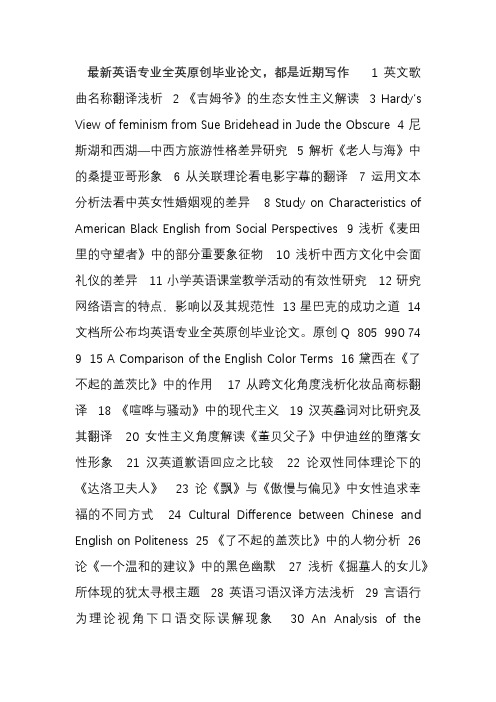
最新英语专业全英原创毕业论文,都是近期写作 1 英文歌曲名称翻译浅析 2 《吉姆爷》的生态女性主义解读3 Hardy’s View of feminism from Sue Bridehead in Jude the Obscure 4 尼斯湖和西湖—中西方旅游性格差异研究 5 解析《老人与海》中的桑提亚哥形象 6 从关联理论看电影字幕的翻译 7 运用文本分析法看中英女性婚姻观的差异 8 Study on Characteristics of American Black English from Social Perspectives 9 浅析《麦田里的守望者》中的部分重要象征物 10 浅析中西方文化中会面礼仪的差异 11 小学英语课堂教学活动的有效性研究12 研究网络语言的特点,影响以及其规范性 13 星巴克的成功之道 14 文档所公布均英语专业全英原创毕业论文。
原创Q 805 990 74 9 15 A Comparison of the English Color Terms 16 黛西在《了不起的盖茨比》中的作用17 从跨文化角度浅析化妆品商标翻译18 《喧哗与骚动》中的现代主义 19 汉英叠词对比研究及其翻译 20 女性主义角度解读《董贝父子》中伊迪丝的堕落女性形象21 汉英道歉语回应之比较22 论双性同体理论下的《达洛卫夫人》23 论《飘》与《傲慢与偏见》中女性追求幸福的不同方式24 Cultural Difference between Chinese and English on Politeness 25 《了不起的盖茨比》中的人物分析26 论《一个温和的建议》中的黑色幽默 27 浅析《掘墓人的女儿》所体现的犹太寻根主题 28 英语习语汉译方法浅析29 言语行为理论视角下口语交际误解现象30 An Analysis of the Character of Scarlett in Gone With the Wind31 论修辞在英语广告中的应用32 浅议《女勇士》中的个人英雄主义 33 中美企业文化研究34 “集体无意识”理论观照下艾米莉的悲剧性 35 浅析中西文化数字含义的差异与原因 36 中美商务谈判差异研究及建议37 对《名利场》中女主人公的性格特征分析38 Comparaison entre l’Histoire d’A Q et l’Etranger 39 “面子”文化与中西方为人处世观40 从餐桌礼仪看中美饮食文化差异 41 苔丝死之谜 42 论《傲慢与偏见》中的妇女地位问题43 《荆棘鸟》中主要女主人公爱情观比较44 初中英语阅读技能教学45 论人文主义在《哈克贝利.费恩历险记》中的体现46 《傲慢与偏见》中话语标记语的语用推理研究 47 功能对等视角下记者招待会古诗词翻译策略研究48 英汉动物词语隐喻意义的对比分析 49 The Tragic Destiny of Brett Ashley in The Sun Also Rises 50 战争留下的伤痛--《太阳照常升起》主要人物对比 51 论美国情景喜剧《老友记》中的言语幽默 52 《榆树下的欲望》之农场意象--基于生态女性主义的分析53 分析《贵妇画像》中伊莎贝尔的个性特点54 《夜访吸血鬼》中的模糊性别观55 “垮掉的一代”形成的背景探析 56 从文化的角度理解《喜福会》中的母女关系57 关于《白鲸》中的象征主义手法运用的研究与探讨58 从接受美学视角看葛浩文《红高粱家族》英译本中的译者主体性59 瓦尔登湖畔的隐士:反抗与变革 60 论中文电视栏目名称的英语翻译 61 高中英语教学过程中实施情感教育的研究62 从功能对等理论谈中国小吃名英译63 论新闻英语的语言特点 64 A Comparison of the English Color Terms 65 初中英语课堂教学的任务型活动设计66 论《奥兰多》中双性同体观 67 全身反应教学法在儿童英语教学中的运用 68 美国电影片名翻译研究 69 中英数字词语文化内涵对比研究 70 《红字》中的基督教因素初探71 从翻译美学角度评析白朗宁夫人“How do I Love Thee?”四种汉译本的得失72 Influence of Western Food Culture upon Chinese People 73 电影《苔丝》的缺失——与原著《德伯家的苔丝》的比较 74 中美时间观差异对跨文化交际的影响75 从《麦琪的礼物》看欧亨利留给世人的礼物 76 浅析李尔王的陷落 77 顺应论视野下茶文化负载词的英译策略 78 英文商务信函的语言特点和写作原则 79 高中英语阅读教学中学生自主学习能力的培养80 《雾都孤儿》中批判现实主义写作手法分析 81 在归隐中相遇—论梭罗与陶渊明的诗意人生 82 Cultural Influences on Business Negotiation between China and Japan 83 A Comparative Analysis of Jane Eyre’s Chinese Renditions in Different Periods 84 《小妇人》中的家庭教育及它对现代家庭教育的意义 85 浅析《飘》中女性主义的萌发 86 西方文化中的吸血鬼形象与东方文化中的鬼形象之对比87 《游泳者》中的象征意象分析88 中西方大学中第二课堂的角色研究 89 论托妮莫里森《最蓝的眼睛》中的母女关系 90 论《献给艾米莉的玫瑰》中的悲剧之源91 露易莎•梅•奥尔科特《小妇人》中的新女性独立精神92 模糊语在国际商务谈判中的语用功能研究93 唯美主义在道连格雷变化中的体现94 Individual Factors in the Tragedy of The Lady with the Camellias 95 浅析Grice的会话合作原则在求职面试中的应用 96 目的论视角下的幽默性语言翻译研究—以刘炳善汉译《伊利亚随笔》为例97 从象征主义视角看《阿拉比》和《一个干净明亮的地方》98 [毕业论文](经贸英语系毕业论文)浅析广告创意对营销的影响——以聚美优品为例99 评《简爱》中的现实主义和浪漫主义100 浅析英文电影片名的翻译技巧101 从关联理论看英文电影字幕翻译中的减译102 浅谈《鲁滨逊漂流记》中现实主义元素103 英文商务信函中的礼貌策略研究104 《楚门的世界》中的黑色幽默 105 中西方聚会文化差异比较研究 106 母语在中学英语教学中的作用 107 《小王子》中的象征意蕴的分析 108 通过《生活大爆炸》分析美国情景喜剧中的文化109 A Probe into the Chinese and English Neologisms 110 从合作原则和礼貌原则的角度分析外贸函电中否定信息的传递111 广播英语的语言学分析 112 奥巴马演讲辞的话语分析 113 李白对庞德和他的作品的影响 114 中医英译的现实情况研究 115 从童话看中西方儿童教育的差异 116 乔伊斯《都柏林人》中瘫痪主题分析 117 《愤怒的葡萄》主人公性格分析118 试析海明威《丧钟为谁而鸣》中的人物形象119 研究交替传译中的笔记特征以及它对翻译准确度的影响 120 论幽默元素在《老友记》字幕中的翻译 121 中国文化元素在功夫熊猫中的体现及其翻译122 马克吐温在<<哈克贝里费恩历险记>>中对人类社会的深切关注123 《月亮与六便士》中查尔斯•思特里克兰德的追寻自我124 英汉新词理据对比研究 125 合作学习模式在高中英语口语教学中的应用 126 试析《道连•格雷的画像》中的伦理冲突127 从唯美主义角度分析《莎乐美》中邪恶的灵魂128 A Comparison of the English Color Terms 129 试论霍桑小说《胎记》中的象征主义130 A Comparison of the English Color Terms131 从大卫•芬奇《七宗罪》看宗教极端主义 132 《呼啸山庄》爱情悲剧的原因探析133 美国西部文学中的牛仔形象所体现出的美国英雄主义134 浅析英汉词汇中的性别歧视现象及其成因135 杰克凯鲁亚克与垮掉的一代136 浅析广告英语的修辞特点137 对目前金融危机的分析 138 The Otherization of China in The Woman Warrior 139 初中英语口语教学的课堂管理 140 从合作原则的角度分析广告语的修辞特点 141 初中生英语自主学习能力培养的研究142 The Differences of Beauty Standards Between China and America 143 浅析中西方对同性恋态度的差异--以《喜宴》为例144 “去十九号房”中的自由观 145 从翻译美学视角探析文学作品翻译——以《了不起的盖茨比》为例 146 从女性主义视角看《蝴蝶梦》147 初中英语说写技能综合教学研究148 基于概念隐喻的英语习语研究149 别样的美丽——析《厄舍古屋的倒塌》中无处不在的哥特式风格150 从三美原则看中国古诗词中酒意象的英译 151 Influence, Barriers and Soft CulturalPower in Cross-cultural Communication 152 简奥斯汀对英国小说的贡献——以《傲慢与偏见》为例153 从杨必翻译的《名利场》看文学翻译中的归化与异化 154 论《红字》中的孤独因素 155 萨拉的性格魅力 156 英汉禁忌语对比研究 157 英语商务信函的文体和语言特点 158 高中英语课堂教学中的口语教学 159 试论盖茨比对其梦想生活的追求160 试用标记模式理论分析广告语中的语码混用现象161 162 论《亚瑟王之死》中的骑士精神163 模因论指导下的英语习语汉译164 从无知到成熟:论爱玛的成长历程 165 英汉语言中红色联想意义的比较 166 浅谈文化差异对国际商务谈判的影响及对策167 史蒂芬•克莱恩《红色英勇勋章》中的自然主义表现手法 168 试比较《汤姆索亚历险记》与《哈克贝利芬历险记》中主人公性格异同点169 论商标名称的翻译对品牌形象的影响170 《围城》英译本中文化负载词的翻译171 女性的赞歌—《愤怒的葡萄》中乔德妈和罗撒香两位女性的坚强性格分析172 Roberta’s Role in An American Tragedy 173 The Application of Cooperative Learning in High School English Teaching 174 寻找自我——从女性意识角度解读《觉醒》 175 威尔斯的对等翻译理论在商务翻译中的应用176 英语法律文本翻译原则 177 The Strategies and Translation of Politeness in English Business Letters 178 汉语习语中文化负载词的英译179 初中英语词汇教学法研究综述180 跨文化视野下的中国形象——以好莱坞电影为例181 Contrariety of William Blake--Image Analysis of Songs of Innocence and of Experience 182 功能对等理论视角下英语言语幽默的翻译—以《老友记》为例183 高中英语互动式课堂教学模式研究184 “中式英语”和“中国英语”两个概念的区别研究:以公示语为例185 华裔美国文学中的幽灵叙事探析186 形合与意合对比研究及翻译策略187 On the Influence of the Female Characters On Pip in Great Expectations 188 论《睡谷传奇》中的幽默元素189 论内莉丁恩在《呼啸山庄》中的作用190 《警察与赞美诗》和《重新做人》中主人公的不同命运 191 林语堂翻译思想探究——以《浮生六记》英译本为例192 论《红字》中“A”的象征意义193 论《小伙子古德曼布朗》中象征主义的使用194 《野性的呼唤》中巴克的性格形成过程分析 195 目的论视角下的广告翻译 196 中美穿越剧中文化构架差异研究——以《步步惊心》和《回到未来》为例197 从目的论的角度浅析美国电影字幕翻译198 观电影《刮痧》简析中西文化价值冲突 199 英语新闻标题:特点及翻译 200 归化与异化策略在字幕翻译中的运用。
《木马赢家》的伦理思索

外国电影评论Forein Film ReviewD.H劳伦斯(1885-1930)是20世纪最受争议的作家之一,其文学作品享誉全世界,他总是在写他生命中感受最深的东西,以精湛的艺术和描写人性的深刻而被读者所喜爱。
他的短篇小说《木马赢家》,从一个侧面反映了西方工业社会中金钱对健康和谐的人际关系的扭曲。
这部作品于创作于1926年,在他去世后1933年才得以发表。
之后,这个短篇被收录在辛西娅·阿奎斯夫人主编的《鬼怪作品:十六个新的神秘故事》集里。
1949年,由英国导演兼编剧安东尼·佩利西埃(Anthony Pelissier)改编并搬上银幕,这是劳伦斯的第一个短篇小说被搬上银幕;到1998年,美国著名导演米歇尔·阿米瑞亚德(Michael Almereyda)再次将其搬上银幕,并获得了汉普顿斯国际电影节的最佳影片(Hamptons International Film Festival Golden Starfish Award) 。
该影片的传播扩大了劳伦斯在世界上的影响。
我们知道电影与文学之间有着先天的亲缘关系,电影改编不是原封不动地将作品搬上银幕,而是在把握原著的基本精神和情节脉络的基础上,选择一个独特的视角,对原作进行必要的改编,使原作焕发出新的光彩,对文学作品的传播与普及做出了贡献。
故事背景是一战后英国的中产家庭。
海斯特,一位漂亮的母亲,有三个非常可爱的孩子,一个男孩,两个女儿,孩子们渴望母爱,但是母亲却不能感觉到爱,因为对金钱的追求已经窒息了她的母爱的天性,使她丧失了爱的能力。
故事讲述的是他们一家人住在带花园的豪宅里,身边有办事周到的仆人,他们都觉得生活得比邻居们优越。
可是,由于母亲收入微薄,做事高不成,低不就,志向高远的父亲挣得也不多,使他们觉得很难长久维持其奢侈的生活,母亲整日抱怨丈夫无能,儿子保罗从母亲眼中看不到爱,却总能在家中听见一个诡异的声音不断轻声低语:“一定要有更多的钱!一定要有更多的钱!”这声音是从摇摆木马的弹簧里传出来的。
木马赢家 中文版

《木马赢家》戴维·赫伯特·劳伦斯有位美妇人,本来具有各种优势,然而她并不幸运。
她为了爱情而涉足婚姻,但这爱已化为了灰烬。
她有几个瘦骨如柴的孩子,然而她觉得这些孩子是强加在她头上的,她无法爱她们。
他们冷冷地看着她,好像在找她的岔。
匆然间,她觉得必须掩饰自己的缺点。
然而,要掩饰什么她也不知道。
不过,当孩子们在场的时候,她总是感到了自己的铁石心肠。
这给她增添了麻烦,在行为上,她比以前越发温柔,更加挂念她的孩子,好像她非常疼爱她们。
只有她自己明白,她内心深处,是一个体会不到爱的旮旯,不,体会不到对任何人的爱。
谈到她时,人人都说?“她是这样一个好母亲,深爱自己的孩子。
”只有她自己,孩子们自己才知道事实并非如此。
他们从对方的眼神中看出了这一点。
她有一个男孩与两个小女孩,他们住在一幢舒适带花园的房子,他们拥有体贴人的仆人,觉得比街道上的任何人都高人一等。
尽管他们生活入时,但总是感到有一种焦虑。
钱总是不够用。
母亲有一份微薄的收入,父亲也有一份微薄的收入,但几乎不足以维持他们不得不维持的社会地位。
父亲在城里任职。
但尽管他有好的前景,但从未实现。
尽管他们生活入时,但总觉得负担重,少钱用。
终于,母亲说:“我想看看我能干点什么。
”但她不知从何干起。
他绞尽脑汁,尝试了一件又一件的事情,但没有一件成功。
失败使他脸上长满了皱纹。
孩子在一天天长大,她们得上学。
需要更多的钱,更多的钱。
父亲总是出手大方、养成了一些颇费金钱的兴趣。
似乎从来不会做一些值得一做的事。
这位信心满怀的母亲未取得任何成功,并且她的兴趣味也颇费金钱。
于是,这房子萦绕着这句无声的话语:得有更多的钱!更多的钱!尽管没人大声地说出来,但孩子们时时都可以听到。
当圣诞节来了时,昂贵而漂亮的玩具摆满在儿童室,他们听到了这句话。
那匹出众的新木马后面,那漂亮的木偶住的房子后面,传来了一阵阵耳语声:得有更多的钱!得有更多的钱!孩子们会停下来听听这声音。
他们相互面视,看看是否大家都听到了。
《木马赢家》中的二元对立
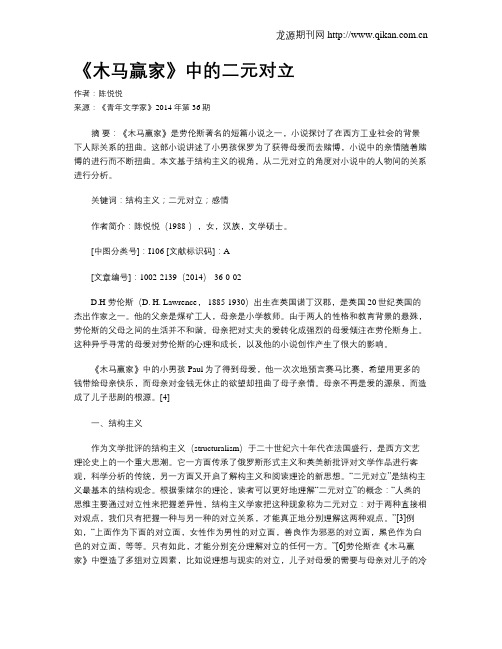
《木马赢家》中的二元对立作者:陈悦悦来源:《青年文学家》2014年第36期摘要:《木马赢家》是劳伦斯著名的短篇小说之一,小说探讨了在西方工业社会的背景下人际关系的扭曲。
这部小说讲述了小男孩保罗为了获得母爱而去赌博,小说中的亲情随着赌博的进行而不断扭曲。
本文基于结构主义的视角,从二元对立的角度对小说中的人物间的关系进行分析。
关键词:结构主义;二元对立;感情作者简介:陈悦悦(1988-),女,汉族,文学硕士。
[中图分类号]:I106 [文献标识码]:A[文章编号]:1002-2139(2014)-36-0-02D.H 劳伦斯(D. H. Lawrence, 1885-1930)出生在英国诺丁汉郡,是英国20世纪英国的杰出作家之一。
他的父亲是煤矿工人,母亲是小学教师。
由于两人的性格和教育背景的悬殊,劳伦斯的父母之间的生活并不和谐。
母亲把对丈夫的爱转化成强烈的母爱倾注在劳伦斯身上。
这种异乎寻常的母爱对劳伦斯的心理和成长,以及他的小说创作产生了很大的影响。
《木马赢家》中的小男孩Paul为了得到母爱,他一次次地预言赛马比赛,希望用更多的钱带给母亲快乐,而母亲对金钱无休止的欲望却扭曲了母子亲情。
母亲不再是爱的源泉,而造成了儿子悲剧的根源。
[4]一、结构主义作为文学批评的结构主义(structuralism)于二十世纪六十年代在法国盛行,是西方文艺理论史上的一个重大思潮。
它一方面传承了俄罗斯形式主义和英美新批评对文学作品进行客观,科学分析的传统,另一方面又开启了解构主义和阅读理论的新思想。
“二元对立”是结构主义最基本的结构观念。
根据索绪尔的理论,读者可以更好地理解“二元对立”的概念:“人类的思维主要通过对立性来把握差异性,结构主义学家把这种现象称为二元对立:对于两种直接相对观点,我们只有把握一种与另一种的对立关系,才能真正地分别理解这两种观点。
”[3]例如,“上面作为下面的对立面,女性作为男性的对立面,善良作为邪恶的对立面,黑色作为白色的对立面,等等。
《木马赢家》中家庭教育对孩子成长的影响

Page 13
凡的欢喜,一幕幕泛黄在那片笑声、那些照片的夕阳里。
家庭教育的重要性
良好的家庭 教育是优化 孩子心灵的
催化剂
良好的家 庭教育是 造就人才 的必要条
件
家庭教育是 教育人的起 点和基点
Page 14
明,生命战胜死亡的过程,而促成这一过程得以完
Page 11
作者wrence
思想特征
劳伦斯生活在19世纪末、20世纪初这一风云变幻、动荡不安的 时代。他感受到了一战以后西方社会不断加深的精神危机和社 会危机,尤其使他不安和忧虑的是现代工业文明对人的严重摧 残。他认为资本主义工业革命的首要罪恶是它压抑和歪曲了认 得自然本性,特别是性和性爱。因此他厌恶现代工业文明,崇 尚原始的、生机盎然的大自然。他认为现代的人性涅槃的最高 境界和最终目的是一种与自然的彻底融合。他祈求以两性关系 在感情与肉体上的双重融合来恢复人的天性,恢复原始的、自 然的 、充满活力的生命个体,进而达到使被工业化摧残了生机的英 国和人类社会获得再生。然而,劳伦斯毕竟是一个理想主义者, 他的想法过于天真与浪漫。在工业文明的侵袭面前,人应当保 留自然天性,抗拒人性的异化,但历史总是向前发展的,人类 一旦进入文明社会,就无法再返回自然,两性关系的调节更无 法抗拒文明对人的异化。因此,作为一种社会理想,劳伦斯坚 持以恢复人与自然的本性,特别是自然状态的性爱,来克服西 方现Pa代ge 社12 会异化的现象,显然是不切实际的。
木马赢家
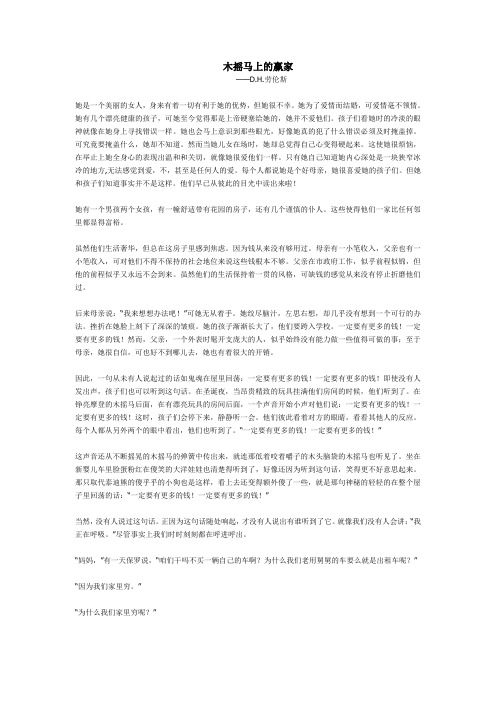
木摇马上的赢家——D.H.劳伦斯她是一个美丽的女人,身来有着一切有利于她的优势,但她很不幸。
她为了爱情而结婚,可爱情毫不领情。
她有几个漂亮健康的孩子,可她至今觉得那是上帝硬塞给她的,她并不爱他们。
孩子们看她时的冷淡的眼神就像在她身上寻找错误一样。
她也会马上意识到那些眼光,好像她真的犯了什么错误必须及时掩盖掉。
可究竟要掩盖什么,她却不知道。
然而当她儿女在场时,她却总觉得自己心变得硬起来。
这使她很烦恼,在举止上她全身心的表现出温和和关切,就像她很爱他们一样。
只有她自己知道她内心深处是一块狭窄冰冷的地方,无法感觉到爱,不,甚至是任何人的爱。
每个人都说她是个好母亲,她很喜爱她的孩子们。
但她和孩子们知道事实并不是这样。
他们早已从彼此的目光中读出来啦!她有一个男孩两个女孩,有一幢舒适带有花园的房子,还有几个谨慎的仆人。
这些使得他们一家比任何邻里都显得富裕。
虽然他们生活奢华,但总在这房子里感到焦虑。
因为钱从来没有够用过。
母亲有一小笔收入,父亲也有一小笔收入,可对他们不得不保持的社会地位来说这些钱根本不够。
父亲在市政府工作,似乎前程似锦,但他的前程似乎又永远不会到来。
虽然他们的生活保持着一贯的风格,可缺钱的感觉从来没有停止折磨他们过。
后来母亲说:“我来想想办法吧!”可她无从着手。
她绞尽脑汁,左思右想,却几乎没有想到一个可行的办法。
挫折在她脸上刻下了深深的皱痕。
她的孩子渐渐长大了,他们要跨入学校。
一定要有更多的钱!一定要有更多的钱!然而,父亲,一个外表时髦开支庞大的人,似乎始终没有能力做一些值得可做的事;至于母亲,她很自信,可也好不到哪儿去,她也有着很大的开销。
因此,一句从未有人说起过的话如鬼魂在屋里回荡:一定要有更多的钱!一定要有更多的钱!即使没有人发出声,孩子们也可以听到这句话。
在圣诞夜,当昂贵精致的玩具挂满他们房间的时候,他们听到了。
在铮亮摩登的木摇马后面,在有漂亮玩具的房间后面,一个声音开始小声对他们说:一定要有更多的钱!一定要有更多的钱!这时,孩子们会停下来,静静听一会。
欲望机器操纵下的木偶--《木马赢家》中人性的异化

111作者简介:仵澄澄,西安外国语大学英文学院2017级英语语言文学专业硕士研究生,研究方向:中英(美)文学比较。
欲望机器操纵下的木偶——《木马赢家》中人性的异化欲望机器操纵下的木偶——《木马赢家》中人性的异化仵澄澄(西安外国语大学英文学院 陕西 西安 710128)摘要:《木马赢家》作为戴维•赫伯特•劳伦斯晚年的短篇小说之一,探讨了劳伦斯所关注的人与人之间的关系,从侧面反映出西方工业文明社会下,金钱对人性的蚕食与扭曲。
本文结合埃利希•弗洛姆的异化理论,从“异化”这个角度分析《木马赢家》中人性异化的体现,探讨其根源。
揭示金钱诱惑下血亲的畸形和扭曲金钱观的变态以及此短篇小说对现代人的启示。
关键词:异化 人性 《木马赢家》中图分类号:I561 文献标识码:A 文章编号:1009-5349(2019)09-0111-02戴维•赫伯特•劳伦斯是英国最著名的小说家、诗人、剧作家、散文家和文学评论家之一。
在他短暂的一生中,他写了许多很受欢迎的小说。
其中《木马赢家》是他最著名的短篇小说之一,书写了20世纪的工业化下的英国社会。
本文将从埃利希•弗洛姆的异化理论的角度来分析异化特征及其关系的表现。
通过这种方式,本文试图探讨西方工业文明下人们异化的原因。
一、异化美国学者弗洛姆,是西方马克思主义理论家之一,也是新精神分析学派的重要成员。
他将弗洛伊德的精神分析与马克思的异化理论结合起来,重点把“异化”定义为一种认知方式,即“自己是自己活动的主体”。
他不知道自己是自己世界的中心,是自己行为的主宰,却成了自己行为的奴隶。
一个被疏远的人失去了与自己的联系,就像他失去了与他人的联系一样(弗洛姆,2003:121)。
弗洛姆认为,在工业社会,人们被他们消费的物质所疏远,同时也被社会力量所疏远。
“被异化的人失去了自己和创造力,也失去了爱的能力,‘真爱’是人类内在生产力的表现”(弗洛姆,2006:58)。
无论马克思的异化还是弗洛姆的异化,都是指自我、本质、主体性、精神自由和个性的丧失。
扭曲关系终酿悲剧——论《儿子与情人》和《木马赢家》中扭曲的母
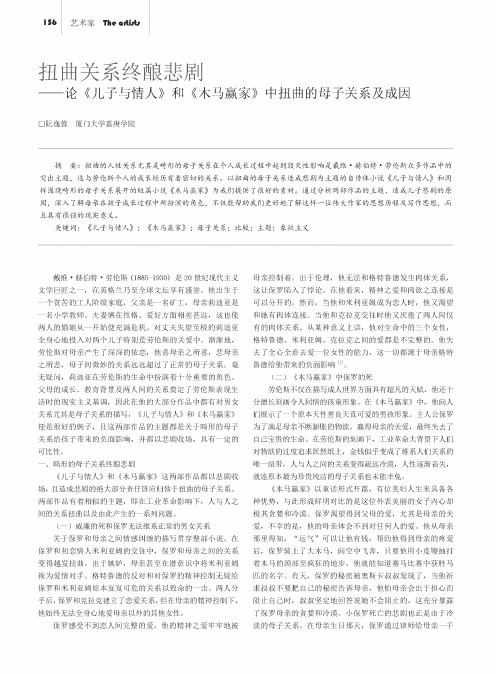
扭曲关系终酿悲剧——论《儿子与情人》和《木马赢家》中扭曲的母子关系及成因□阮逸蓉厦门大学嘉庚学院摘要:扭曲的人性关系尤其是畸形的母子关系在个人成长过程中起到毁灭性影响是戴维•赫伯特•劳伦斯众多作品中的突出主题,这与劳伦斯个人的成长经历有着密切的关系。
以扭曲的母子关系造成悲剧为主题的自传体小说《儿子与情人》和同样围绕畸形的母子关系展开的短篇小说《木马赢家》为我们提供了很好的素材。
通过分析两部作品的主题、造成儿子悲剧的原因,深入了解母亲在孩子成长过程中所扮演的角色,不仅能帮助我们更好地了解这样一位伟大作家的思想历程及写作思想,而且具有很强的现实意义。
关键词:《儿子与情人》;《木马赢家》;母子关系;比较;主题;象征主义戴维•赫伯特•劳伦斯(1885-1930)是20世纪现代主义文学巨匠之一,在英格兰乃至全球文坛享有盛誉。
他出生于 一个贫苦的工人阶级家庭,父亲是一名矿工,母亲莉迪亚是一名小学教师。
夫妻俩在性格、爱好方面相差甚远,这也使两人的婚姻从一开始便充满危机。
对丈夫失望至极的莉迪亚全身心地投入对两个儿子特别是劳伦斯的关爱中。
渐渐地,劳伦斯对母亲产生了深深的依恋,他喜母亲之所喜,悲母亲之所悲,母子间微妙的关系远远超过了正常的母子关系。
毫无疑问,莉迪亚在劳伦斯的生命中扮演着十分重要的角色。
父母的成长、教育背景及两人间的关系奠定了劳伦斯表现生活时的现实主义基调,因此在他的大部分作品中都有对男女关系尤其是母子关系的描写,《儿子与情人》和《木马赢家》便是很好的例子,且这两部作品的主题都是关于畸形的母子关系给孩子带来的负面影响,并都以悲剧收场,具有一定的可比性。
一、畸形的母子关系终酿悲剧《儿子与情人》和《木马赢家》这两部作品都以悲剧收场,且造成悲剧的绝大部分责任皆应归咎于扭曲的母子关系。
两部作品有着相似的主题,即在工业革命影响下,人与人之间的关系扭曲以及由此产生的一系列问题。
(一)威廉的死和保罗无法维系正常的男女关系关于保罗和母亲之间情感纠缠的描写贯穿整部小说。
论《木马赢家》中的写作技巧
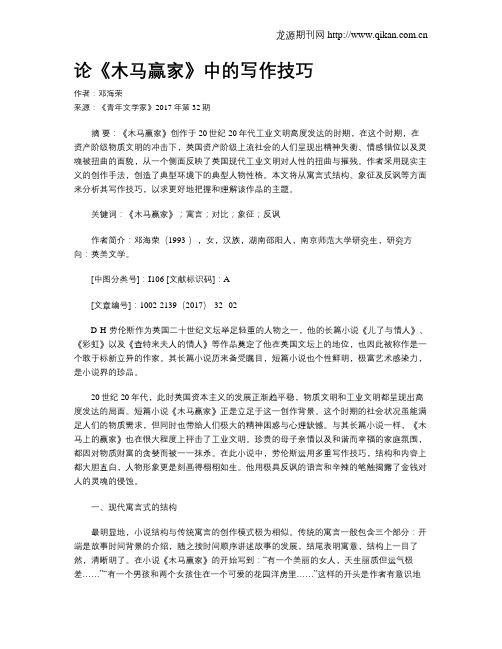
论《木马赢家》中的写作技巧作者:邓海荣来源:《青年文学家》2017年第32期摘要:《木马赢家》创作于20世纪20年代工业文明高度发达的时期,在这个时期,在资产阶级物质文明的冲击下,英国资产阶级上流社会的人们呈现出精神失衡、情感错位以及灵魂被扭曲的面貌,从一个侧面反映了英国现代工业文明对人性的扭曲与摧残。
作者采用现实主义的创作手法,创造了典型环境下的典型人物性格。
本文将从寓言式结构、象征及反讽等方面来分析其写作技巧,以求更好地把握和理解该作品的主题。
关键词:《木马赢家》;寓言;对比;象征;反讽作者简介:邓海荣(1993-),女,汉族,湖南邵阳人,南京师范大学研究生,研究方向:英美文学。
[中图分类号]:I106 [文献标识码]:A[文章编号]:1002-2139(2017)-32--02D·H·劳伦斯作为英国二十世纪文坛举足轻重的人物之一,他的长篇小说《儿了与情人》、《彩虹》以及《查特来夫人的情人》等作品奠定了他在英国文坛上的地位,也因此被称作是一个敢于标新立异的作家。
其长篇小说历来备受瞩目,短篇小说也个性鲜明,极富艺术感染力,是小说界的珍品。
20世纪20年代,此时英国资本主义的发展正渐趋平稳,物质文明和工业文明都呈现出高度发达的局面。
短篇小说《木马赢家》正是立足于这一创作背景。
这个时期的社会状况虽能满足人们的物质需求,但同时也带给人们极大的精神困惑与心理缺憾。
与其长篇小说一样,《木马上的赢家》也在很大程度上抨击了工业文明。
珍贵的母子亲情以及和谐而幸福的家庭氛围,都因对物质财富的贪婪而被一一抹杀。
在此小说中,劳伦斯运用多重写作技巧,结构和内容上都大胆直白,人物形象更是刻画得栩栩如生。
他用极具反讽的语言和辛辣的笔触揭露了金钱对人的灵魂的侵蚀。
一、现代寓言式的结构最明显地,小说结构与传统寓言的创作模式极为相似。
传统的寓言一般包含三个部分:开端是故事时间背景的介绍,随之按时间顺序讲述故事的发展,结尾表明寓意,结构上一目了然,清晰明了。
困境与突围——劳伦斯《木马赢家》解读
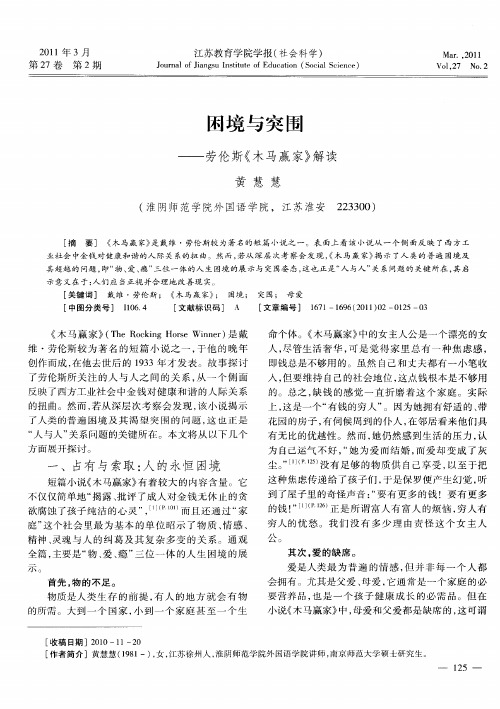
己, 改变 着 与孩 子们 的关 系 。也 就是 说 , 在小 说 《 木 马赢家》 , 中 随着 情 节 的展 开 , 爱 也在 逐 渐 彰 显 与 母
回归 。这 一点不仅 可 以从小 说 中母 亲 和保 罗 的频繁
二 、付 出与 消亡 : 围的代 价 突
《 木马赢家 》 中的主人公 虽 然 陷人 了种种生存 的 困境 中 , 但他 们并 没有 束 手 就 擒 、 以 待毙 , 坐 而是 奋
对话 中得 到 印证 , 且 还 可 以从 母 亲 的行 为 中发 展 而
种缺位 的状态 , 似乎 在这 个家 庭里 根 本就 不存 在 。
小 说里提 到“ 亲 ” 父 的字 眼一共 四次 , 且 与孩 子 们 而 始 终处于 平行 而 非交 叉 的关 系。这 种 “ 代 型 父 亲 替 的失 败对男 主人 公保 罗 的命运 与性 格 的形 成造 成 了 很大 的影 响 。父 亲 的缺席 导致 了保 罗 俄狄 浦斯 情结
功 后 , 罗颇 有成 就感 , 为 自己可 以救母 亲走 出困 保 认 境 , 家庭 从 此 可 以过 上 和谐 安 宁 的生 活 。没有 料 让 到 的是 , 他赚 的钱越 多 , 亲 的开支 就越 大 , 母 家里 “ 要
为人 父母 的过 错 和悲 哀 , 是 现 代 金钱 社 会 里 最 为 更
Vo1 2 No. .7 2
困境 与 突 围
— —
劳伦 斯《 马赢 家》 木 解读
黄 慧 慧
( 阴师 范 学 院 外 国语 学 院 ,江 苏 淮 安 2 3 0 ) 淮 2 3 0
《木马赢家》中的人物介绍
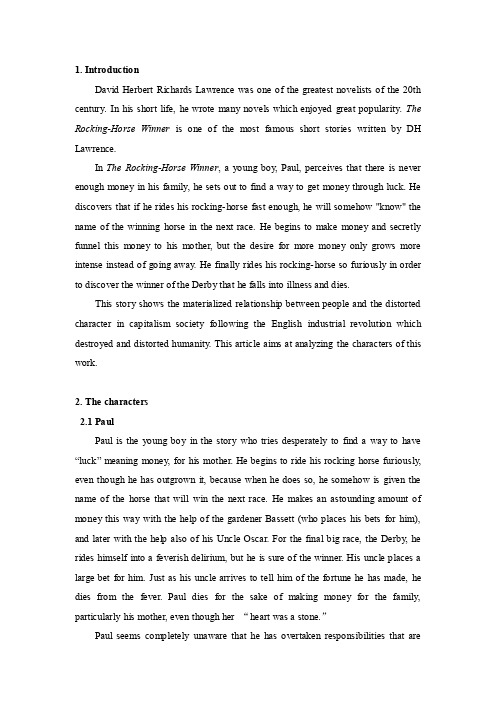
1. IntroductionDavid Herbert Richards Lawrence was one of the greatest novelists of the 20th century. In his short life, he wrote many novels which enjoyed great popularity. The Rocking-Horse Winner is one of the most famous short stories written by DH Lawrence.In The Rocking-Horse Winner, a young boy, Paul, perceives that there is never enough money in his family, he sets out to find a way to get money through luck. He discovers that if he rides his rocking-horse fast enough, he will somehow "know" the name of the winning horse in the next race. He begins to make money and secretly funnel this money to his mother, but the desire for more money only grows more intense instead of going away. He finally rides his rocking-horse so furiously in order to discover the winner of the Derby that he falls into illness and dies.This story shows the materialized relationship between people and the distorted character in capitalism society following the English industrial revolution which destroyed and distorted humanity. This article aims at analyzing the characters of this work.2.The characters2.1 PaulPaul is the young boy in the story who tries desperately to find a way to have “luck”meaning money, for his mother. He begins to ride his rocking horse furiously, even though he has outgrown it, because when he does so, he somehow is given the name of the horse that will win the next race. He makes an astounding amount of money this way with the help of the gardener Bassett (who places his bets for him), and later with the help also of his Uncle Oscar. For the final big race, the Derby, he rides himself into a feverish delirium, but he is sure of the winner. His uncle places a large bet for him. Just as his uncle arrives to tell him of the fortune he has made, he dies from the fever. Paul dies for the sake of making money for the family, particularly his mother, even though her “heart was a stone.”Paul seems completely unaware that he has overtaken responsibilities that arerightly his parents’. He seems only concerned with relieving the anxiety he perceives in the house caused by a lack of money. He tries to understand why there is not enough money by asking his mother, but she only says that his father “has no luck.”He directly associates luck with money, so the gambling seems like a natural solution to the problem. He is so innocent in his enthusiasm for the game he begins playing with Bassett that even when his uncle discovers that he has been gambling, he does not stop Paul from gambling further. Even though Paul is still a child, all of the adults, Bassett, Uncle Oscar, and Paul’s mother, seem to treat him like an adult. No one anticipates that Paul will pay a huge price for playing this game. No one even questions Paul’s ability to pick the winners of the horse races, or wonders how in the world Paul is able to pick winners so accurately.Throughout the story Paul remains innocent, as well as desperate, to help his mother, who seems oblivious to Paul’s concerns. Although it is clear to the reader that Paul is very intelligent and sensitive, no one in the story seems to notice or appreciate Paul’s gifts until it is too late.2.2 HesterHester is Paul’s mother, who is incapable of loving others. She is not only obsessed with money, but she is also irresponsible with the money she does get. When Paul arranges through his attorney to give her a thousand pounds a month from his winnings, she immediately begs the attorney for the entire amount. However, instead of paying her debts, she spends the money on new things for the house. This results in an even greater need for more money. She also does not express any thanks for this sudden windfall, depriving Paul of the joy of providing the much-needed income for his family.Although at the end of the story Hester becomes increasingly concerned about Paul’s deteriorating health, she still does not love him, even when he dies. At the beginning of the story, it is stated that “at the center of her heart was a hard little place that could not feel love, no, not for anybody.”This image is repeated at the end of the story, when Hester sits by her son’s bedside “feeling her heart had gone,turned actually into a stone.”Before he dies Paul asks “Mother, did I ever tell you? I’m lucky,”she responds, “No, you never did.”However, the reader remembers that Paul did, indeed, tell her that he was lucky earlier in the story. Since she pays little attention to him, she does not remember this.When Hester finally receives the financial fortune she has always wanted but loses her son in the process, the reader realizes that Hester will probably not feel the loss of her son and will probably waste all that money in record time. All of these details show Hester to be cold, unfeeling, wasteful, and shallow.2.3 BassettBassett is the family gardener who helps Paul place bets on horses. He used to work around horses and racing and he talks about racing all the time, so it seems reasonable that Paul would seek his advice. He takes the boy seriously and follows all the boy’s instructions in placing the bets. He also keeps Paul’s money safely hidden away, at least until Uncle Oscar gets involved. He is the only adult who treats Paul with a serious respect. It is Bassett’s seriousness that convinces Uncle Oscar that Paul’s gift for picking winners is real. He is trustworthy and kind, but he is also a servant, so once Uncle Oscar takes over, he respectfully withdraws from the action. So he is passive, loyal, a little bit afraid of his superiors, and somewhat greedy to the extent he participates in Paul’s winnings at the track.2.4 Oscar CresswellOscar Cresswell is Paul’s uncle and Hester’s brother. He is in a better financial position than Hester, since he owns his own car and a place in Hampshire. This is because he inherited the entire family fortune, leaving Hester to depend on her husband for support. It is Uncle Oscar who stumbles upon Paul’s secret of earning money through gambling, but he does not at first believe in Paul’s gift. He thinks that Paul is not serious and treats the boy as if he were merely playing a game. After Oscar realizes that Paul’s tips are dependable, he encourages the gambling. Oscar arranges for a lawyer to funnel money to Hester. He also bets his own money, using Paul’s tips for his own profit.Although Uncle Oscar seems harmless at first, the reader becomes aware that heis using Paul for his own benefit. He makes no effort to teach Paul about being careful with money or the dangers of gambling. Oscar does nothing to help Hester and her family, neither by giving money nor by helping Hester budget what money she does have. Because Oscar only uses Paul for his own financial gain, he is revealed to be shallow and selfish.3. ConclusionThis novel is short in length, and there are only four main characters. However, the author uses very skillful describe techniques which perfectly creates the vivid characters of this novel. D.H Lawrence criticized the stupid and ignorant situation of modern society and the degenerated humanity in his later works by his talented writing and “The Rocking-Horse Winner” is a typical one.Reference王军.英国短篇小说赏析.新华出版社,2007 年1 月.秦立慧.浅析《木马赢家》中失职的父母,吉林省教育学院学报,2012年7月. 魏平玲.《木马赢家》中保罗的自卑情绪探析,安徽工业大学学报:社会科学版,2011年第6期。
_木马赢家_中保罗之死的原因
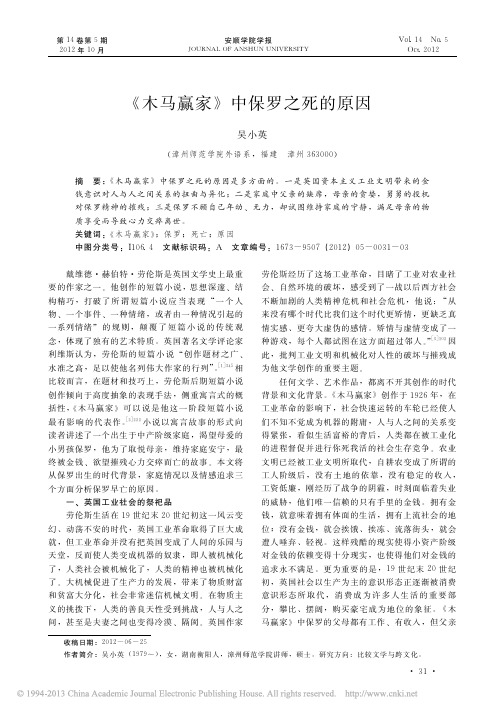
第 14 卷 第 5 期 2012年10月
戴维德·赫伯特·劳伦斯是英国文学史上最重 要 的 作 家 之 一 。 他 创 作 的 短 篇 小 说 ,思 想 深 邃 、 结 构精巧,打破 了 所 谓 短 篇 小 说 应 当 表 现 “一 个 人 物、一个事件、一种情绪,或者由一种情况引起的 一系列情绪” 的 规 则, 颠 覆 了 短 篇 小 说 的 传 统 观 念,体现了独有的艺术特质。英国著名文学评论家 利维斯认为,劳伦斯 的 短 篇 小 说 “创 作 题 材 之 广、 水准之高,足以使他名 列 伟 大 作 家 的 行 列”。[1]345相 比较而言,在题材和技巧上,劳伦斯后期短篇小说 创作倾向于高度抽象的表现手法,侧重寓言式的概 括性,《木马赢 家》 可 以 说 是 他 这 一 阶 段 短 篇 小 说 最 有 影 响 的 代 表 作。[2]222 小 说 以 寓 言 故 事 的 形 式 向 读者讲述了一个出生于中产阶级家庭,渴望母爱的 小男孩保罗,他为了取悦母亲,维持家庭安宁,最 终被金钱、欲望摧残心力交瘁而亡的故事。本文将 从保罗出生的时代背景,家庭情况以及情感追求三 个方面分析保罗早亡的原因。
安 顺 学 院 学 报 2012 年 第 5 期
的追求,成为他自身的情感追求,他希望能挑起家
结语
庭重担,企图用钱来换取亲情和母爱,主动成为了
在不合时宜的社会里,没有感情的家庭,妄图
母亲挣钱的牺牲品。
从被金钱蒙蔽心智的母亲那里得到宝贵的母爱,注
- 1、下载文档前请自行甄别文档内容的完整性,平台不提供额外的编辑、内容补充、找答案等附加服务。
- 2、"仅部分预览"的文档,不可在线预览部分如存在完整性等问题,可反馈申请退款(可完整预览的文档不适用该条件!)。
- 3、如文档侵犯您的权益,请联系客服反馈,我们会尽快为您处理(人工客服工作时间:9:00-18:30)。
1. IntroductionDavid Herbert Richards Lawrence was one of the greatest novelists of the 20th century. In his short life, he wrote many novels which enjoyed great popularity. The Rocking-Horse Winner is one of the most famous short stories written by DH Lawrence.In The Rocking-Horse Winner, a young boy, Paul, perceives that there is never enough money in his family, he sets out to find a way to get money through luck. He discovers that if he rides his rocking-horse fast enough, he will somehow "know" the name of the winning horse in the next race. He begins to make money and secretly funnel this money to his mother, but the desire for more money only grows more intense instead of going away. He finally rides his rocking-horse so furiously in order to discover the winner of the Derby that he falls into illness and dies.This story shows the materialized relationship between people and the distorted character in capitalism society following the English industrial revolution which destroyed and distorted humanity. This article aims at analyzing the characters of this work.2.The characters2.1 PaulPaul is the young boy in the story who tries desperately to find a way to have “luck” meaning money, for his mother. He begins to ride his rocking horse furiously, even though he has outgrown it, because when he does so, he somehow is given the name of the horse that will win the next race. He makes an astounding amount of money this way with the help of the gardener Bassett (who places his bets for him), and later with the help also of his Uncle Oscar. For the final big race, the Derby, he rides himself into a feverish delirium, but he is sure of the winner. His uncle places a large bet for him. Just as his uncle arrives to tell him of the fortune he has made, he dies from the fever. Paul dies for the sake of making money for the family, particularly his mother, even though her “heart was a stone.”Paul seems completely unaware that he has overtaken responsibilities that arerightly his parents’. He seems only concerned with relieving the anxiety he perceives in the house caused by a lack of money. He tries to understand why there is not enough money by asking his mother, but she only says that his father “has no luck.”He directly associates luck with money, so the gambling seems like a natural solution to the problem. He is so innocent in his enthusiasm for the game he begins playing with Bassett that even when his uncle discovers that he has been gambling, he does not stop Paul from gambling further. Even though Paul is still a child, all of the adults, Bassett, Uncle Oscar, and Paul’s mother, seem to treat him like an adult. No one anticipates that Paul will pay a huge price for playing this game. No one even questions Paul’s ability to pick the winners of the horse races, or wonders how in the world Paul is able to pick winners so accurately.Throughout the story Paul remains innocent, as well as desperate, to help his mother, who seems oblivious to Paul’s concerns. Although it is clear to the reader that Paul is very intelligent and sensitive, no one in the story seems to notice or appreciate Paul’s gifts until it is too late.2.2 HesterHester is Paul’s mother, who is incapable of loving others. She is not only obsessed with money, but she is also irresponsible with the money she does get. When Paul arranges through his attorney to give her a thousand pounds a month from his winnings, she immediately begs the attorney for the entire amount. However, instead of paying her debts, she spends the money on new things for the house. This results in an even greater need for more money. She also does not express any thanks for this sudden windfall, depriving Paul of the joy of providing the much-needed income for his family.Although at the end of the story Hester becomes increasingly concerned about Paul’s deteriorating health, she still does not love him, even when he dies. At the beginning of the story, it is stated that “at the center of her heart was a hard little place that could not feel love, no, not for anybody.”This image is repeated at the end of the story, when Hester sits by her son’s bedside “feeling her heart had gone,turned actually into a stone.”Before he dies Paul asks “Mother, did I ever tell you? I’m lucky,”she responds, “No, you never did.”However, the reader remembers that Paul did, indeed, tell her that he was lucky earlier in the story. Since she pays little attention to him, she does not remember this.When Hester finally receives the financial fortune she has always wanted but loses her son in the process, the reader realizes that Hester will probably not feel the loss of her son and will probably waste all that money in record time. All of these details show Hester to be cold, unfeeling, wasteful, and shallow.2.3 BassettBassett is the family gardener who helps Paul place bets on horses. He used to work around horses and racing and he talks about racing all the time, so it seems reasonable that Paul would seek his advice. He takes the boy seriously and follows all the boy’s instructions in placing the bets. He also keeps Paul’s money safely hidden away, at least until Uncle Oscar gets involved. He is the only adult who treats Paul with a serious respect. It is Bassett’s seriousness that convinces Uncle Oscar that Paul’s gift for picking winners is real. He is trustworthy and kind, but he is also a servant, so once Uncle Oscar takes over, he respectfully withdraws from the action. So he is passive, loyal, a little bit afraid of his superiors, and somewhat greedy to the extent he participates in Paul’s winnings at the track.2.4 Oscar CresswellOscar Cresswell is Paul’s uncle and Hester’s brother. He is in a better financial position than Hester, since he owns his own car and a place in Hampshire. This is because he inherited the entire family fortune, leaving Hester to depend on her husband for support. It is Uncle Oscar who stumbles upon Paul’s secret of earning money through gambling, but he does not at first believe in Paul’s gift. He thinks that Paul is not serious and treats the boy as if he were merely playing a game. After Oscar realizes that Paul’s tips are dependable, he encourages the gambling. Oscar arranges for a lawyer to funnel money to Hester. He also bets his own money, using Paul’s tips for his own profit.Although Uncle Oscar seems harmless at first, the reader becomes aware that heis using Paul for his own benefit. He makes no effort to teach Paul about being careful with money or the dangers of gambling. Oscar does nothing to help Hester and her family, neither by giving money nor by helping Hester budget what money she does have. Because Oscar only uses Paul for his own financial gain, he is revealed to be shallow and selfish.3. ConclusionThis novel is short in length, and there are only four main characters. However, the author uses very skillful describe techniques which perfectly creates the vivid characters of this novel. D.H Lawrence criticized the stupid and ignorant situation of modern society and the degenerated humanity in his later works by his talented writing and “The Rocking-Horse Winner” is a typical one.Reference王军.英国短篇小说赏析.新华出版社,2007 年1 月.秦立慧.浅析《木马赢家》中失职的父母,吉林省教育学院学报,2012年7月.魏平玲.《木马赢家》中保罗的自卑情绪探析,安徽工业大学学报:社会科学版,2011年第6期。
